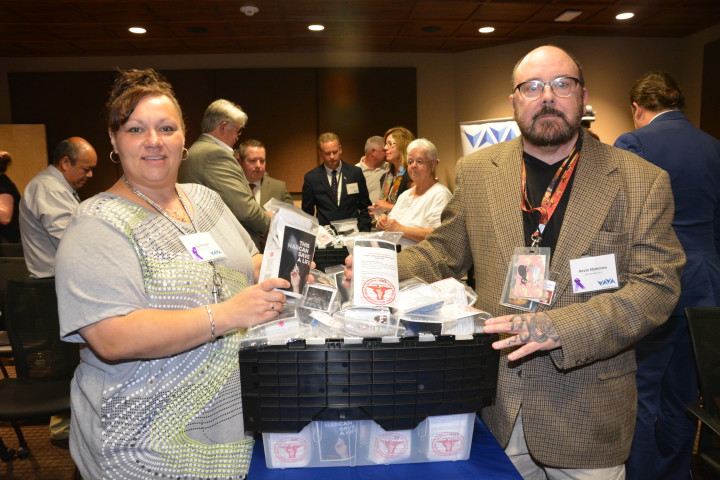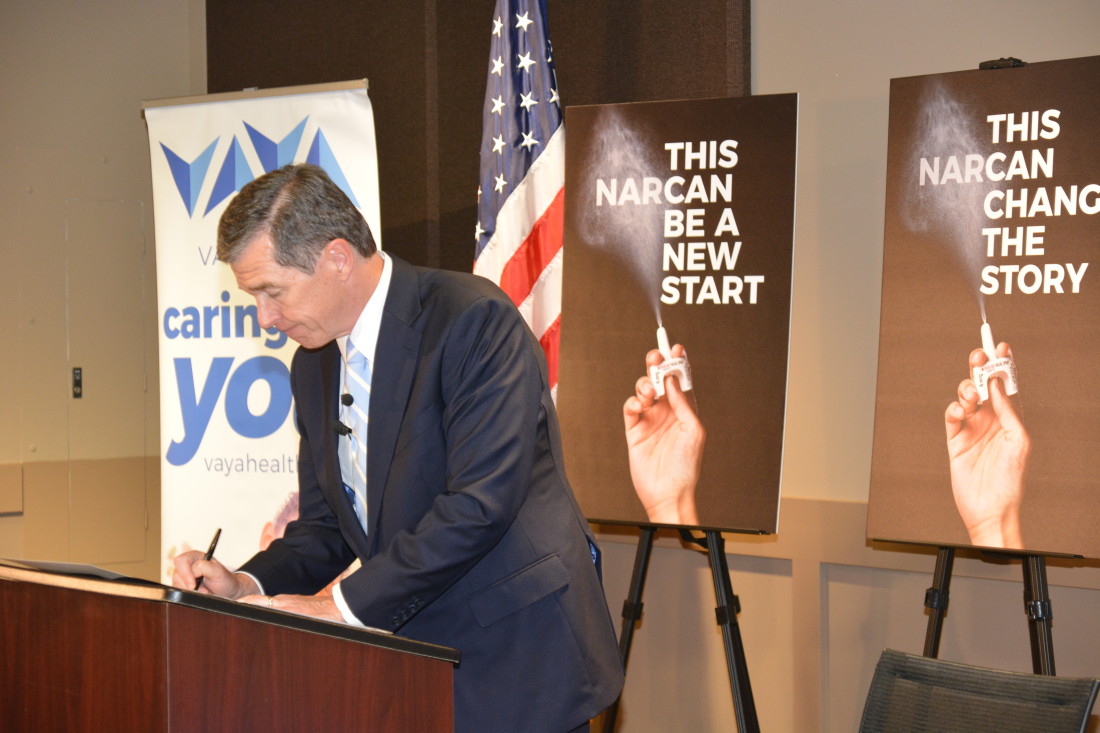Gov. Roy Cooper came to Asheville on Thursday to proclaim September as Drug and Alcohol Recovery Month in the state and to pledge his support for efforts that would effectively increase access to treatment for substance use disorder.
“Every day in North Carolina, four people die from opioid overdose,” Cooper said before reading and signing the declaration. “Nationally, more people die from accidental overdoses than die in car accidents.”
He followed his remarks by putting together a Narcan kit — two doses of naloxone (the generic name for Narcan), the substance that reverses the effects of overdose, and information on where to find help in overcoming addiction.
Thanks to a grant from the state, Vaya Health, the regional mental health, substance abuse and developmental disabilities services management agency, has 2,400 such kits, each with two doses, available for distribution in the 23 counties of Western North Carolina.
Cooper said the state is developing a 34-point plan to address the issue of opioid addiction, a plan that would include law enforcement assistance diversion that would place people in treatment instead of jail.
“Law enforcement people will tell you we cannot arrest our way out of this problem,” Cooper said.
Another approach is integrated care that treats physical and behavioral health issues together and reduces the stigma people feel over having a substance use disorder.
“If you have cancer, you get treatment,” he said.
Cooper also talked about increasing the availability of insurance to people who need treatment.
“We cannot take health insurance away from millions of people and fight this epidemic,” he said. “People need insurance to gain access to treatment.”
Educating doctors about the best ways to prescribe pain medications and educating the public about how dangerous opioids can be is another important factor in the battle to control the epidemic, said Dr. Jeff Heck, CEO of the Mountain Area Health Education Center, which is the high-risk obstetrics and gynecology provider for the region.
“Last year we had 400 newborns test positive for substances harmful to them out of 2,400 babies born through our clinic,” Heck said. “The incidence keeps rising nationally and locally.”
MAHEC also works to educate physicians about the best ways to prescribe opioids, such as writing prescriptions for fewer pills when the need is short-term.
Cooper met with several people who are in recovery and who work as peer support to help others get into and stay in recovery – a model that has been used successfully by 12-step groups for decades.

Sue Poston started using after the drowning death of her 2 ½-year-old daughter in 1998. The pills offered some relief from the post-traumatic stress and depression, but before long, the pills were a bigger problem than her PTSD and depression.
She began in recovery four years ago and now works for the nonprofit Sunrise Community, the first peer-staffed and peer-managed recovery community in the region, as its program director. As someone who has lived through addiction, Poston knows she can help others navigate the waters.
“This work is what gets me out of bed in the morning,” she said. “We can meet people where they are because we have been there.”
Cooper also mentioned that the state has a plan to expand access to a treatment called Carolina Cares, which would expand Medicaid but would differ somewhat from other states’ expansions. The plan, which would cover treatment for addiction for low-income people, was filed as House Bill 662 in April but has not been voted on by the legislature.



Before you comment
The comments section is here to provide a platform for civil dialogue on the issues we face together as a local community. Xpress is committed to offering this platform for all voices, but when the tone of the discussion gets nasty or strays off topic, we believe many people choose not to participate. Xpress editors are determined to moderate comments to ensure a constructive interchange is maintained. All comments judged not to be in keeping with the spirit of civil discourse will be removed and repeat violators will be banned. See here for our terms of service. Thank you for being part of this effort to promote respectful discussion.